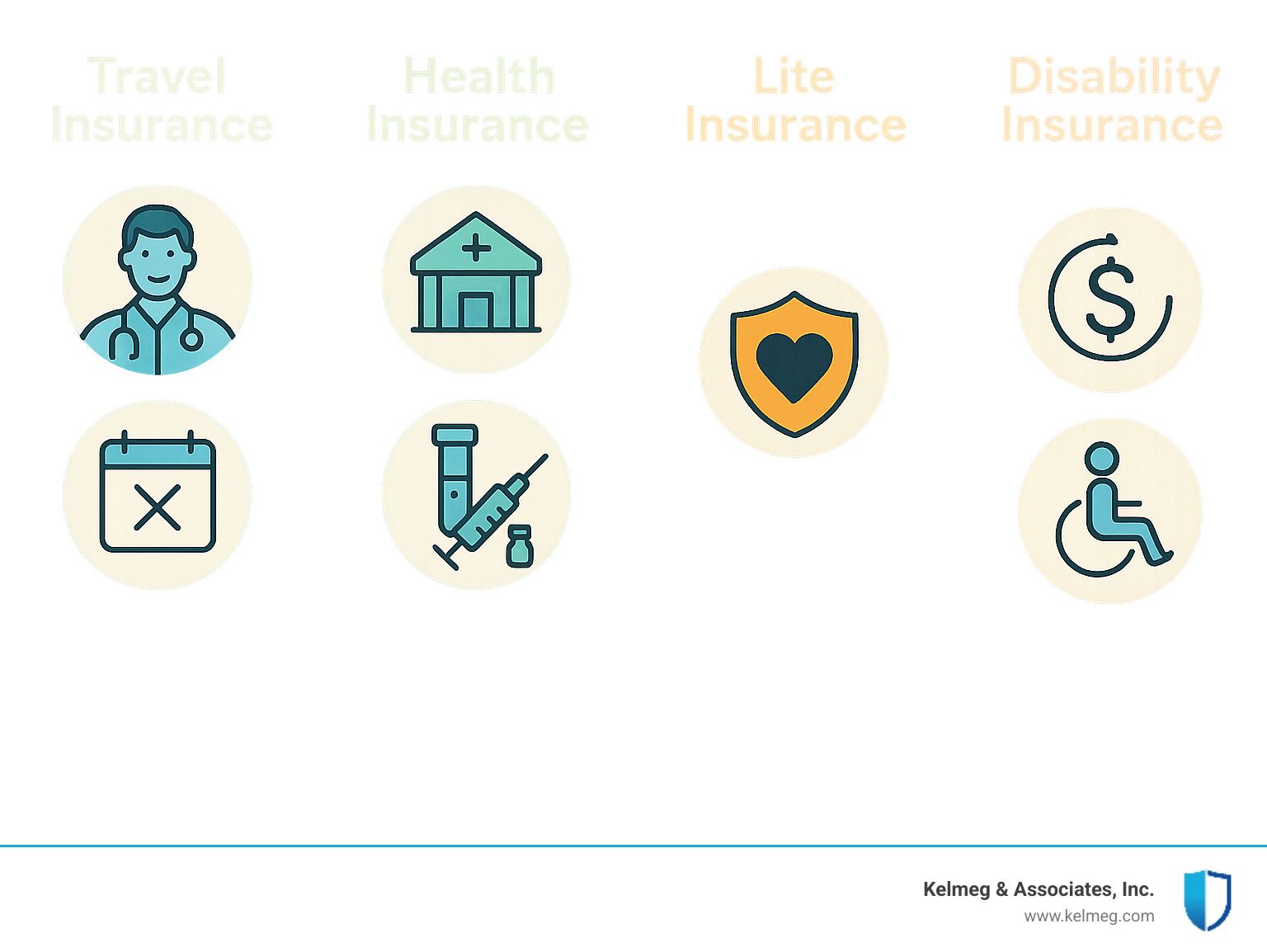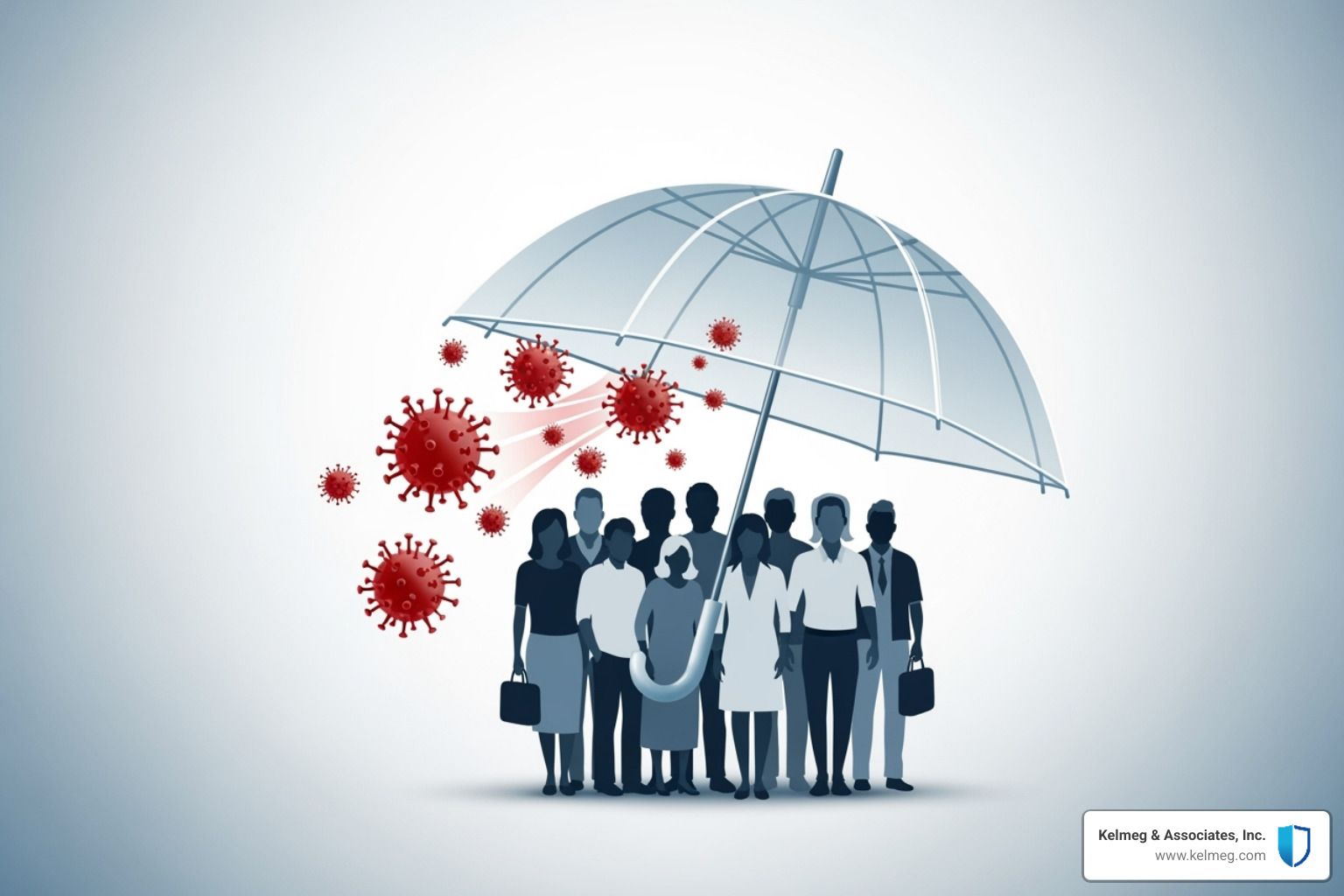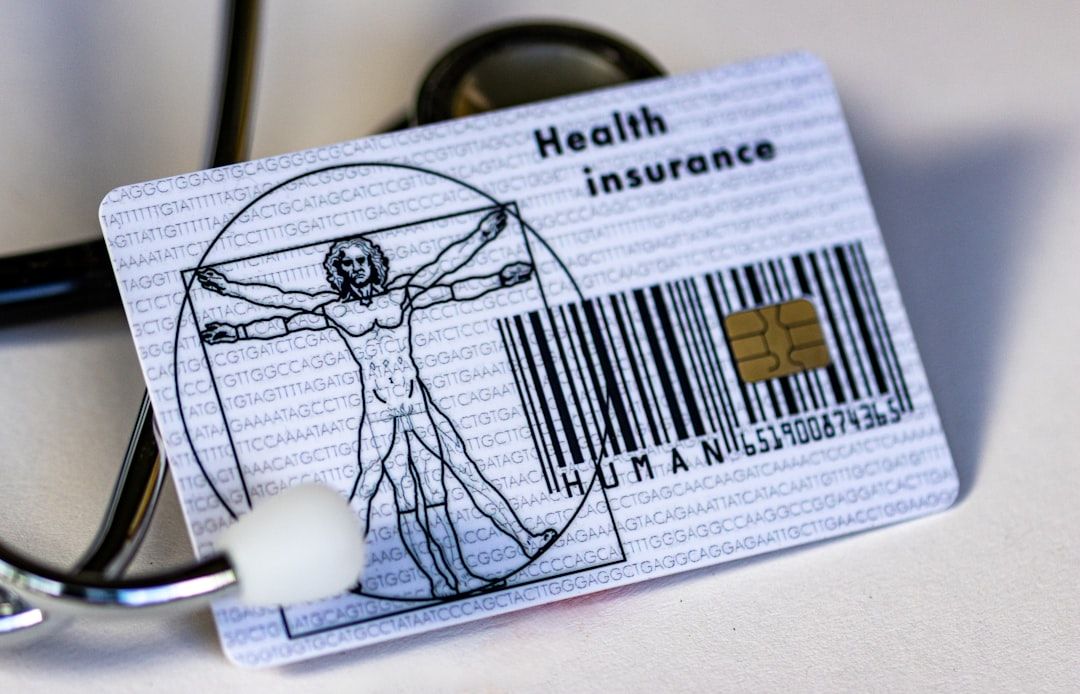Covid-19 Coverage Unmasked: Understanding Your Insurance Options
Why Understanding COVID-19 Insurance Coverage Matters More Than Ever

Insurance covering Covid-19 has become essential as we steer the post-pandemic world. Whether you're planning a trip or simply want to understand your health plan's COVID-related expenses, the insurance landscape has changed. The end of the Public Health Emergency means many free testing and treatment benefits are now subject to your insurance plan's terms.
Quick Answer: Types of Insurance That Cover COVID-19
- Travel Insurance: Medical treatment abroad, trip cancellation, quarantine costs
- Health Insurance: Domestic treatment, testing, vaccines (coverage varies by plan)
- Life Insurance: Death benefits for COVID-related deaths (no pandemic exclusions)
- Disability Insurance: Income replacement if unable to work due to COVID-19
From travel insurance that covers emergency medical treatment to understanding how your domestic health plan handles Long COVID, the rules are complex. Some policies offer up to $5 million in emergency medical coverage for vaccinated travelers, while others may have specific exclusions. With the right knowledge, you can protect yourself financially. The key is understanding what each type of insurance covers, what it excludes, and how to choose the right combination for your needs.
I'm Kelsey Mackley, an insurance specialist at Kelmeg & Associates, Inc., where I help Colorado residents steer complex
Insurance covering Covid-19 options. I've seen how the right coverage can provide peace of mind in uncertain times.

The Landscape of Travel Insurance and COVID-19
Travel insurance has evolved to address COVID-19 related risks, from unexpected medical bills to quarantine costs. Insurers have adapted, creating policies that recognize the unique challenges of traveling in a world where a positive test can derail your plans.
What's Typically Covered? From Medical Bills to Quarantine Costs
Most comprehensive travel insurance plans now treat COVID-19 like any other medical emergency.
Emergency medical treatment is the core of this coverage. If you contract the virus during your trip and need medical attention or hospitalization, your travel insurance typically steps in. Some policies provide up to $5 million in emergency medical coverage, especially for vaccinated travelers.
Medical evacuation is crucial if you need transport to a better-equipped facility or back home. Experts recommend at least $100,000 in medical evacuation coverage. Trip interruption benefits can reimburse you for unused trip costs if you must cut your vacation short due to a COVID-19 diagnosis.
One of the most practical additions is coverage for quarantine accommodation and meal allowances. Many policies now include daily allowances for these expenses, some offering up to $200 per person per day.
Here's what most comprehensive travel insurance plans typically cover:
- Emergency medical treatment and hospitalization
- Medical evacuation and repatriation
- Trip interruption benefits
- Quarantine accommodation and meal allowances
- Additional travel costs due to extended stays
Note: Most policies
do not cover mandatory COVID-19 tests required for entry or exit from a country. These are considered expected travel costs.
The Impact of Travel Advisories and Vaccination Status
Your destination and vaccination status can significantly affect your coverage. If you travel to a region with a high-level government travel advisory (e.g., Level 3 or 4), your policy may become void. Insurers often use
known event clauses, meaning that once an advisory is issued, COVID-related issues in that destination are considered foreseeable and not covered.
However, some insurers offer policies that provide coverage even if advisories change. Your vaccination status can also lead to differentiated coverage limits, with fully vaccinated travelers often receiving higher benefit amounts. Before any trip, check the U.S. Department of State Travel Advisories to ensure your policy will be valid.
Canceling Your Trip: Standard Policies vs. "Cancel For Any Reason" (CFAR)
Standard trip cancellation policies have a
fear of travel exclusion, meaning you can't cancel just because you're worried about rising cases. These policies cover specific, unforeseeable events, such as you or an immediate family member contracting COVID-19 right before the trip. Border closures or new travel restrictions are generally not covered reasons for cancellation under standard plans.
This is where "Cancel For Any Reason" (CFAR) upgrades are valuable. CFAR allows you to cancel for nearly any reason not covered by a standard policy. The trade-off is a lower reimbursement, typically 50-75% of your non-refundable trip costs. CFAR has strict eligibility rules: you must usually buy it within 14-21 days of your initial trip payment, insure 100% of your trip costs, and cancel at least 48 hours before departure.
Understanding Coverage Limits and Extensions
When evaluating
Insurance covering Covid-19, pay close attention to
maximum benefit amounts. Coverage for emergency medical care can range from $1 million to $5 million. Also, check
per-day quarantine limits to ensure they are adequate for your destination. Most policies have
trip duration limits, and exceeding them can void your coverage.
If you must quarantine overseas, many policies offer automatic extensions of 5-10 days. For longer delays, you must contact your insurer immediately. The process usually requires documentation like a positive test result or an official quarantine order. Contacting your insurer's emergency assistance line as soon as an issue arises is key to maintaining your coverage.
Navigating Common Exclusions in Your COVID-19 Policy

Understanding policy exclusions is critical to avoiding unexpected out-of-pocket costs. The details matter when it comes to Insurance covering Covid-19.
The "Known Event" Clause and Its Implications
The World Health Organization declared COVID-19 a pandemic on March 11, 2020, making it a "known event" or "foreseeable event" for insurers. This means you can't buy insurance to protect against something that is already a known global issue. If you purchased your policy after this date, claims for trip cancellation due to general pandemic fears are likely excluded. For example, insurers like Manulife and RBC state that trip cancellation due to the pandemic being a known event is generally not covered. However, contracting COVID-19 yourself is typically a covered medical event, which is a different scenario.
Pre-Existing Conditions: Is Your Prior COVID-19 Infection Covered?
A prior COVID-19 infection could be considered a
pre-existing medical condition. Insurers define this as any condition for which you received treatment or advice within a
"look-back period" (typically 90-180 days) before your policy began. Most policies require pre-existing conditions to be
"stable" for a set period before your trip. If you recently had COVID-19 or have lingering symptoms (Long COVID), it might be flagged.
Full disclosure on your application is essential; failing to disclose a condition could void your policy. If you have ongoing health issues, explore options for
individual health insurance for more comprehensive domestic coverage.
What's Almost Never Covered?
Be realistic about what travel insurance won't cover. These exclusions are standard across the industry:
- Mandatory COVID-19 tests: Tests required for entry or exit are considered a routine travel cost, not a medical emergency.
- General travel anxiety: Fear of catching COVID-19 is not a valid reason for cancellation under standard policies. Only a CFAR upgrade would cover this.
- Traveling against medical advice: If your doctor advises against travel for health reasons and you go anyway, your coverage will likely be void.
- Traveling to high-risk destinations: Journeys to locations with a Level 4 "Do Not Travel" advisory from the U.S. Department of State Travel Advisories will typically void your policy.
Beyond Travel: How Your Domestic Health Insurance Handles COVID-19
While travel insurance protects you on trips, your everyday health plan is your primary defense against COVID-19 costs at home. With the end of the Public Health Emergency, it's crucial to understand how your domestic plan handles these expenses.
COVID-19 Coverage Under the Affordable Care Act (ACA)
The end of the Public Health Emergency shifted how COVID-19 services are paid for. The days of zero cost-sharing for most services are over.
- Diagnostic Testing: Tests ordered by a doctor are typically covered, but you'll now be subject to your plan's normal deductible, copay, and coinsurance. Over-the-counter tests may no longer be covered.
- Vaccines: COVID-19 vaccines and boosters are still covered as a preventive service under most plans with no cost-sharing.
- Treatment: For doctor visits, hospitalization, or antiviral medications, your plan's standard cost-sharing rules apply. You will pay your usual copays and deductible until you reach your out-of-pocket maximum.
Understanding your plan is more important than ever. We can help you explore
ACA Plans Colorado or learn more about the
Affordable Care Act.
Medicare and COVID-19: What Seniors Need to Know
Medicare continues to provide comprehensive coverage for COVID-19. Here's a quick breakdown:
- Medicare Part B (Medical Insurance): Covers outpatient needs like doctor visits and medically necessary diagnostic tests.
- Medicare Part A (Hospital Insurance): Covers inpatient hospital stays for severe COVID-19. Standard deductibles and coinsurance apply.
- Medicare Part D (Prescription Drugs): Covers antiviral medications like Paxlovid according to your plan's formulary.
- Telehealth Services: Expanded access to telehealth continues, allowing for remote consultations.
Medicare Advantage plans may have different structures, so review your specific plan. Our team can help you steer
Medicare Advantage Plans Colorado or traditional
Medicare.
Group and Self-Employed Health Plans in Colorado
Whether you have coverage through an employer or are self-employed, your
Insurance covering Covid-19 follows your plan's standard benefit structure.
Employer-sponsored group plans treat COVID-19 like any other illness, with standard cost-sharing. If you're between jobs, COBRA benefits allow you to continue this coverage. For freelancers and small business owners, having robust health insurance is critical. The virus doesn't discriminate based on employment status, and having a plan that covers testing and treatment is essential.
Many plans now offer improved mental health support to help with pandemic-related stress and anxiety. Our team specializes in finding plans for Colorado's entrepreneurs; learn more about Health Insurance For Self Employed Colorado. For specific local information, visit our Covid Coverage Colorado page.
Your Action Plan: Choosing a Policy and Making a Claim

A proactive approach is the best strategy for Insurance covering Covid-19. This section provides a roadmap for selecting the right policy and navigating the claims process.
Checklist for Choosing the Right Insurance covering Covid-19
Finding the right travel insurance plan requires asking the right questions before you commit.
- Assess Your Trip: Where are you going, for how long, and what is your vaccination status? These details affect coverage and cost.
- Review Coverage Limits: Don't skim the fine print. Look for maximum benefits for medical care, evacuation, and trip interruption. Pay special attention to COVID-specific benefits like quarantine expenses. Experts recommend at least $50,000 in Emergency Medical and $100,000 in Medical Evacuation coverage.
- Read the Exclusions: Watch for "known event" clauses, exclusions for high-advisory regions, and remember that mandated tests are rarely covered.
- Check Pre-Existing Condition Rules: Understand stability period requirements and disclose any relevant health history, including prior COVID-19 infections.
- Consider CFAR: If you're worried about border closures or general travel anxiety, "Cancel For Any Reason" (CFAR) coverage offers broader protection, typically reimbursing 50-75% of your costs.
- Verify 24/7 Assistance: Ensure your plan includes a 24/7 emergency assistance line to help you steer healthcare systems abroad.
- Compare Quotes: Don't settle for the first option. Compare quotes from different providers to find the best match.
What to Do If You Test Positive or Must Quarantine Abroad
- If you test positive for COVID-19 abroad, stay calm and follow these steps:
Contact Your Insurer Immediately: This should be your first call unless it's a life-threatening emergency. The insurer's assistance line can direct you to approved facilities and explain your benefits. - Follow Medical and Public Health Instructions: Adhere to all isolation requirements and treatment protocols from local authorities.
- Keep All Documentation: Save every receipt for medical expenses, lodging, meals, and transportation. These are essential for reimbursement.
- Get a Formal Diagnosis: Obtain official paperwork from a licensed medical professional confirming your COVID-19 infection.
- Inform Your Contacts: Keep family and travel companions updated on your situation.
Filing a Claim for Your Insurance covering Covid-19
Once you're home, it's time to file your claim. Most insurers offer online portals to streamline the process.
- Use Online Portals: Submit your claim digitally for faster processing.
- Gather Required Documents: You'll need your policy number, medical reports, positive test results, and all original receipts.
- Meet Claim Deadlines: File your claim promptly as specified in your policy.
- Follow Up: Keep your claim number and check its status regularly online or by phone.
Frequently Asked Questions about Insurance covering Covid-19
Here are quick answers to common questions about how different types of insurance handle COVID-19.
Does life insurance pay out for a death caused by COVID-19?
Generally, yes. Most individual life insurance policies do not have exclusions for pandemics. If the policy was active and premiums were paid, a death from COVID-19 is typically covered like a death from any other illness. The key is
application truthfulness; any material misrepresentations on the original application could jeopardize a claim. As with any claim, official documentation of the
cause of death will be required. For more information, visit our page on
Life Insurance.
Will my health insurance cover "Long COVID" treatment?
Yes. Health insurance plans generally cover
post-COVID conditions just like any other ongoing medical issue. This means
specialist visits,
physical therapy, and
mental health support for symptoms related to Long COVID are typically covered. However, this coverage is
subject to your plan's terms, so your standard deductible, copays, and coinsurance will apply. Work with your healthcare provider to document your symptoms and treatment plan to ensure smooth claims processing.
Do I still need special COVID-19 insurance now that the pandemic is "over"?
It depends on your situation. While the Public Health Emergency has ended, the
continued risk of COVID-19 remains. For international travel,
travel quarantine coverage is still valuable, as some countries may have isolation requirements and your domestic health plan won't cover lodging costs. Furthermore, your domestic plan likely has
medical emergency gaps for care abroad, making travel insurance essential regardless of COVID-19.
For domestic needs, your robust domestic coverage should be sufficient. The goal isn't to buy a separate "COVID-19 policy" but to ensure your comprehensive travel and health insurance adequately cover potential COVID-related events. For more tips on preparing for a healthy trip, you can consult resources like this travel health guide.
Conclusion: Securing Your Peace of Mind in a Post-Pandemic World

As we conclude this guide to Insurance covering Covid-19, it's clear that while the world has changed, the need for careful planning remains. COVID-19 is still a factor to consider in our health and travel decisions.
The key takeaway is the importance of proactive planning. By reading the fine print and understanding exclusions, you can avoid financial surprises. This means choosing travel insurance with adequate quarantine benefits and ensuring your domestic health plan is robust enough for any potential needs, including Long COVID treatment.
Looking ahead, epidemiologists expect COVID-19 to follow a seasonal pattern similar to influenza. That means reviewing your coverage at least once a year—ideally before fall and winter—so benefit limits, network changes, and new riders don’t catch you off guard. Major life events such as marriage, the birth of a child, or retirement can also open special enrollment windows that let you upgrade your protection without waiting for the next open-enrollment period. A quick annual “insurance check-up” ensures the numbers on paper still match your real-world needs and risk tolerance.
At Kelmeg & Associates, Inc., we've seen how the right insurance transforms a potential crisis into a manageable event. Our expert guidance comes at no extra cost to you, as we believe all Colorado residents deserve access to quality insurance advice. We're not just here to sell a policy; we're here to be your trusted advisors.
Don't let uncertainty hold you back. With the right coverage, you can focus on what matters most. Ready to secure your peace of mind? Find your comprehensive Covid coverage plan today and protect your future.













